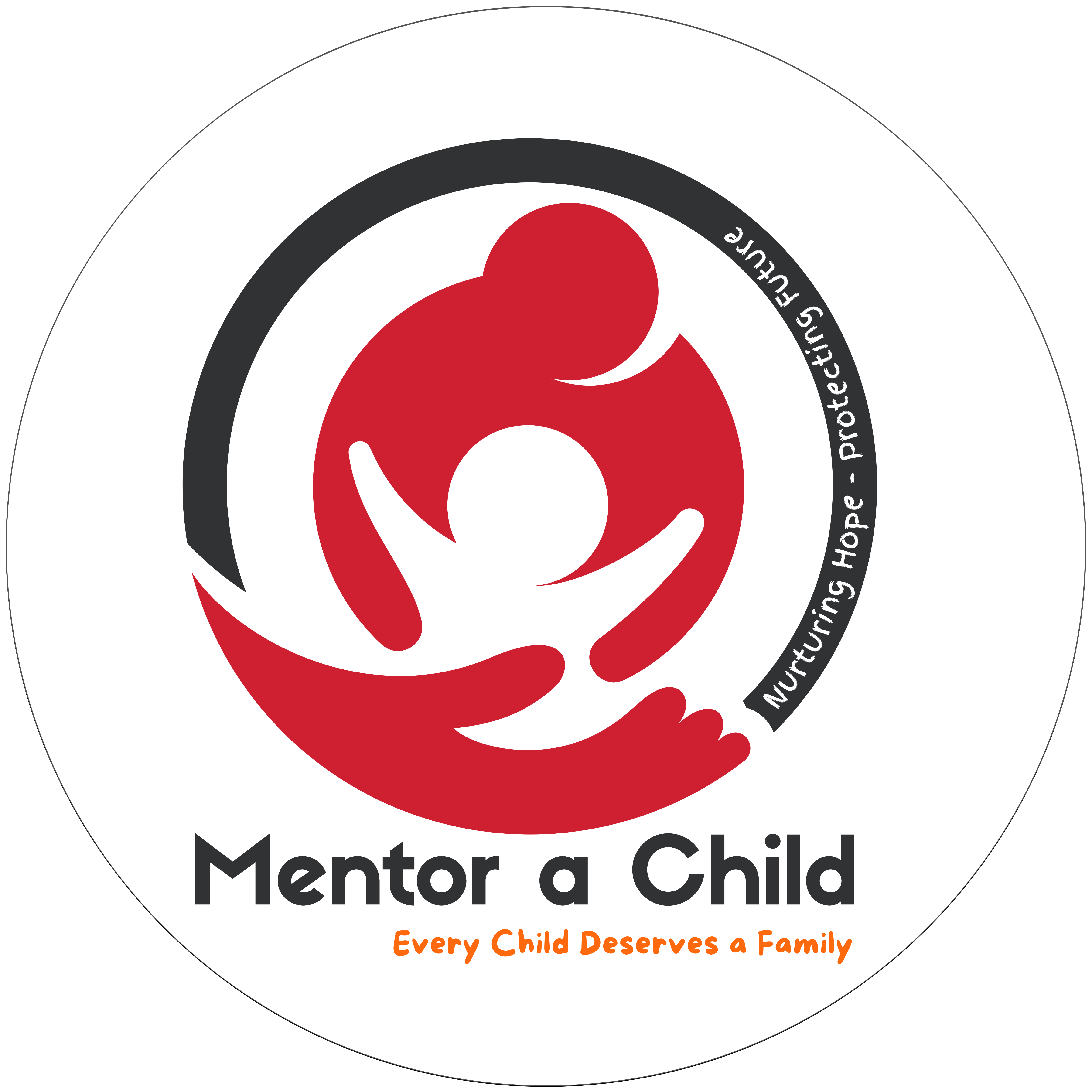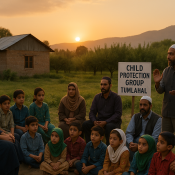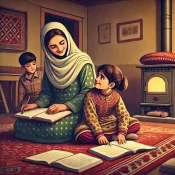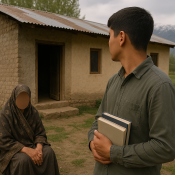
Muskaan
Introduction
Vulnerable children, often caught in the whirlpool of poverty and familial crises, find themselves placed in institutional care.
Despite global evidence emphasising the detrimental effects of such settings on children’s development, institutionalisation persists as a reluctant choice for many families.
Background
Muskaan (Name Changed) is a seventh-grade student from the Shopian district.
She is a village girl whose life was once as simple and warm as a still painting.
Her father used to engage himself as a carpenter and earn his pocket money.
However, when he was diagnosed with a terminal illness, the very foundation of their small household began to crumble.
Her mother was from another state originally and left the family under emotional and financial strain and returned to her own kin.
But as her father’s health started deteriorating, her family faced financial crunch even more.
Two elder brothers of Muskaan stopped their school and went for labor work in nearby villages to keep the house running.
To lighten the burden more, the decision to send Muskaan to a Child Care Institution (CCI) was taken out of desperation, not negligence.
Life at the Institution
Though the CCI promised basic care, Muskaan’s emotional and psychological well-being suffered.
The absence of familial warmth was palpable.
Amidst the institutional walls, she experienced isolation and distress.
A tragic accident during her stay led to severe leg injuries, further amplifying her vulnerabilities.
Intervention
Muskaan’s case was reported under the routine intervention of the UNICEF-supported project ‘Building Community-Based Care and Protection Mechanism for Children in Need of Care and Protection in Kashmir’ by the HWVO.
The project team, which had an intense interest in reintegrating children into family-based care, met Muskaan during a CCI visit.
Despite the emotional strain she bore, her sharp intellect and potential were very evident.
Knowing how institutionalisation could impact her well-being, the team formulated an Individual Care Plan that suited her reintegration.
It was a sensitive process involving emotional counseling and practical support.
The team visited Muskaan’s home several times with each visit building trust and educating the family about the negative long-term effects of institutionalization.
Reintegration Process
After much interaction, Muskaan’s family accepted to take her back home after being assured that her education and basic needs would be catered for.
Still, the pressure of financial constraint was still very much there.
The HWVO team worked together with the CPG to ensure that there would be continuous support.
The CPG agreed to provide for the education and basic needs of Muskaan through persistent follow-ups and advocacy.
Today, Muskaan is thriving in her home environment.
She continues her education at the local school, where her teachers praise her academic excellence.
The family dynamic, though still challenging, has found a rhythm of resilience.
Muskaan balances her studies with assisting in household chores, supported by her brothers who continue to work hard for the family’s sustenance.
Conclusion
Muskaan’s story stresses the importance of the need for community-based care rather than institutionalisation.
Though the shadows of poverty and illness still surround her, the strength of familial bonds, with the support of the community, has lit up her path toward a healthier childhood.
Rekindling Hope
Reintegration of children from institutional settings in Kashmir
In Kashmir, many children find themselves in institutional settings due to family hardships.
Though institutional care is intended as a safety net, global studies repeatedly highlight the detrimental effects such environments can have on children’s emotional and psychological well-being.
Deprived of familial care, they face developmental challenges, emotional distress, and are more vulnerable to neglect and exploitation.
Yet, hope is not lost.
Human Welfare Voluntary Organisation (HWVO), supported by UNICEF, is rewriting this narrative through its project, Building Community Based Care and Protection Mechanism for Children in Need of Care and Protection in Kashmir.
By focusing on reintegration and family-based care, they are offering children a path back to their homes, families, and healthier childhoods.
Muskaan (name changed) from Shopian once enjoyed a happy life.
Her father, a skilled carpenter, ensured her education and supported the household until he was diagnosed with a terminal illness.
As his health deteriorated, the family’s stability crumbled. Her mother, a non-local, left for her native home, leaving Muskaan and her brothers to fend for themselves. While her father grew weaker, her brothers left school to work as laborers.
To ease the financial burden, Muskaan was placed in a Child Care Institution (CCI).
Though meant to provide relief, the experience became traumatic when she met with a serious accident, leaving her emotionally scarred.
It was during a visit to the CCI that HWVO’s team encountered her story.
The team, deeply moved, formulated an Individual Care Plan (ICP) and initiated the reintegration process.
Multiple visits were made to her home, and her family was sensitized about the long-term impacts of institutionalisation.
After persistent counseling, the family agreed to bring Muskaan home, though they were concerned about her education.
The Community-Based Child Protection Group stepped in, offering financial assistance to cover her educational expenses. Muskaan, now back with her family, not only continues her studies but has also begun to heal emotionally in the nurturing embrace of home.
In the quiet Pulwama village, tragedy struck when Mansoor Ahmad, a hardworking labourer and the sole breadwinner for his family, succumbed to a terminal illness. His death left his wife and two young sons, Farzan (11) and Ayaz (5), in utter destitution.
HWVO, alerted by the local child protection group, intervened.
The mother, being a non-local with no support system, faced immense challenges in sustaining her children.
The team provided awareness on government schemes like widow pensions and sponsorship programs under Mission Vatsalya.
However, the bureaucratic delays meant the family needed immediate support.
The local Auqaf Committee and Child Protection Group collaborated to ensure the children’s education remained uninterrupted.
Ayaz was re-enrolled in a local school, and financial aid was arranged for Farzan through a Child Fund Account, securing his nutritional and educational needs.
In another corner of Pulwama, 15-year-old Danishta (name changed) had been institutionalised since the age of 12 — not due to any crisis, but solely for religious education.
Despite her parents being in good health and caring for her siblings at home, she remained isolated in the CCI.
Over time, she faced severe emotional distress, physical health issues, and struggled with hygiene and concentration problems.
When HWVO intervened, her ICP revealed the profound impact of institutionalisation on her well-being.
The team worked tirelessly, engaging with her family to emphasize the importance of nurturing a child in their home environment.
They highlighted how she could continue both her religious and formal education at home.
With consistent follow-ups, the family finally agreed to reintegrate Danishta.
Today, she attends a local higher secondary school and continues her religious education at a nearby seminary.
Post-reintegration assessments show remarkable improvements in her physical and emotional health, reaffirming the power of family care.
The success stories of Muskaan, Farzan, Ayaz, and Danishta reflect a broader movement towards sustainable child welfare in Kashmir.
Through HWVO’s persistent advocacy and the support of UNICEF, institutionalization is being replaced with community-based care—proving that even in hardship, a child’s best chance at healing lies within the warmth of a family.




